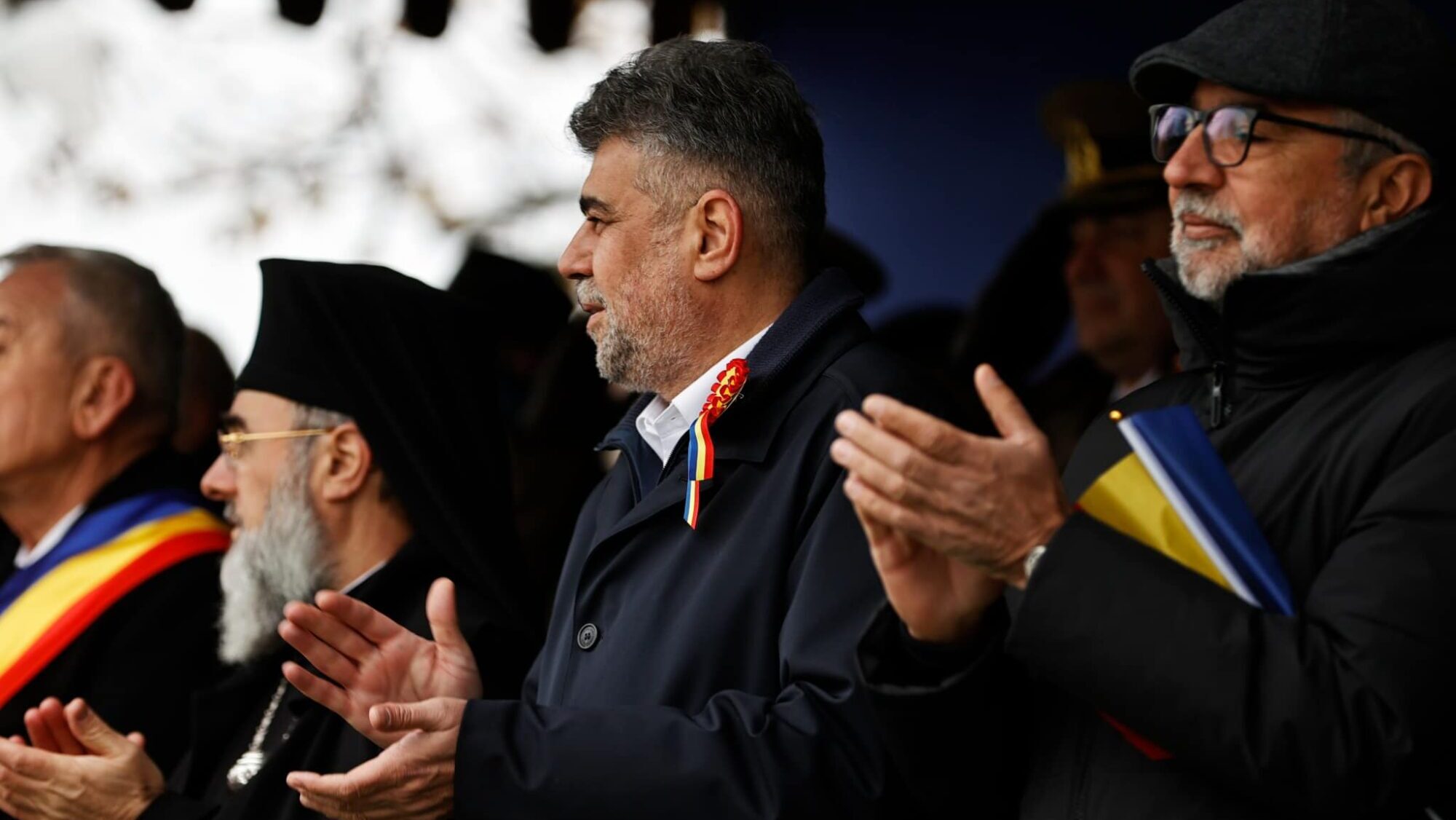
Socialist PM Marcel Ciolacu (center) on election day.
Photo: Marcel Ciolacu on Facebook, 1 December 2024
The social democrat PSD (S&D) won the parliamentary elections in Romania on Sunday, December 2nd, but the surge of nationalist and hard-right parties makes it impossible for them to forge a majority government without the center-right competitors, the PNL (EPP) and USR (Renew).
Political chaos is all but guaranteed in the country’s fragmented political landscape, and the mainstream parties may risk losing more grounds in a potential snap election if coalition talks collapse.
After nearly all the votes were counted, the socialist PSD claimed victory with 22.5%, with the nationalist-sovereigntist AUR (ECR) trailing behind with 18.2%. The third and fourth place went to the center-right PNL (14.3%) and the liberal-progressive USR (12.2%), respectively. The two explicitly Russophile “ultranationalist” parties, SOS Romania and POT also won enough votes to enter parliament, with 7.7% and 6.3%. The final party to enter parliament is the RMDSZ/UDMR, representing the sizable Hungarian minority, with 6.4%.
Romania, preliminary results (96.4% votes counted):
— Europe Elects (@EuropeElects) December 2, 2024
PSD-S&D: 22.5% (-0.9)
AUR-ECR: 17.7% (+0.2)
PNL-EPP: 13.6% (-0.4)
USR-RE: 11.9% (+0.6)
S.O.S.RO-NI: 7.1% (+0.3)
UDMR-EPP: 6.4% (-0.4)
POT-*: 6.2% (+0.3)
SENS~G/EFA: 2.9% (+0.1)
FD→EPP: 2%
+/- vs. 87.1% votes counted… pic.twitter.com/hQpEalZsrc
The exact number of seats hasn’t been calculated yet, but estimates suggest little chance for a stable government to emerge. The socialist PSD leads with 80 seats, followed by AUR’s 65, the PNL’s 51, USR’s 43, SOS Romania’s 27, RMDSZ’s 23, and POT’s 22. The remaining 19 seats go to representatives of smaller ethnic minorities who are each guaranteed one seat by the constitution despite not reaching the required threshold.
With 166 seats needed for a majority, it is clear that these results present a significant challenge for lawmakers trying to navigate coalition talks—especially if they want to avoid the political turmoil of neighboring Bulgaria, which is set to hold its eighth election in just four years due to repeated failures to form stable governments.
Looking at the numbers, the only viable solution for a majority government would be a grand coalition between all three mainstream parties—PNL, PSD, USR—akin to the ‘Ursula-coalition’ of their counterparts (EPP, S&D, Renew) in the European Parliament.
It wouldn’t be the first time that PNL has joined forces with its biggest historical rival, the PSD—Romania has both in its current coalition—but adding the USR to the mix would be much harder to negotiate, as the liberals have fashioned themselves as the main antithesis of the winning socialists in recent years. Therefore, this is an unlikely outcome.
Theoretically, a majority could also emerge from a PSD-AUR-SOS coalition. Despite the socialists being the most direct successors of the communists, they like to pose as the party of religion, family, and traditional values within the pro-European bloc, but breaking the cordon sanitaire around the nationalists (especially the pro-Russia SOS) would be near impossible to justify both domestically and in Brussels.
The PNL have also floated an even broader coalition of all ‘pro-European’ parties (PSD-PNL-USR-RMDSZ) against the Eurosceptics and have said this format would be their starting point during coalition talks. This, however, runs into the problem of the enmity between PSD and USR, so it remains unlikely. But perhaps adding one more EPP member (RMDSZ) into the mix would weaken the socialists’ power within the coalition and therefore make it easier to convince the liberals.
A somewhat sizable but still less-than-stable minority government could be built even without the USR (from PSD, PNL, and RMDSZ), with just 154 seats. Observers believe this scenario to be the most likely outcome at the moment, but it would also put the cabinet at the mercy of the USR to avoid parliamentary deadlocks in key legislation, not to mention the risk of any scandal triggering a no-confidence vote and government collapse.
Some predict that the ultimate outcome would be a center-right coalition between PNL-USR-RMDSZ, with a confidence and supply agreement with the socialists. The PSD would be out of government but still calling the shots with the parliament’s largest faction, ready to pull the plug at a moment’s notice if things don’t go the way they want.
But there’s much that can happen during the talks, and even the four-party mega coalition might happen if the socialists are ready to give up a few key portfolios or compromise on the person of the prime minister.
Regardless, no deal is expected in the following days as the country is still holding its breath ahead of the second round of the presidential election this coming weekend, which will see the USR’s Elena Lasconi face off with “radical populist” Călin Georgescu—an independent candidate closely associated with POT.
Lasconi’s victory would boost the liberals’ negotiating power while electing Georgescu would put the government and the presidency directly at odds with each other, a recipe for more chaos and unpredictability.
To make matters worse, the second round might not even happen, as the Constitutional Court is voting later on Monday (December 2nd) on whether to annul the first round after claims emerged of foreign interference favoring the “ultranationalist” Georgescu.
